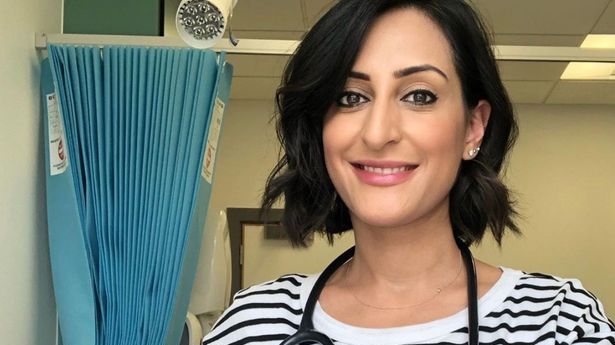
Press release -
Marlow stroke survivor urges people to check for ‘silent condition’ which can cause serious strokes
A stroke survivor from Marlow is backing a charity’s plea for people to carry out a simple test on themselves in case they have a ‘silent condition’ which could cause a serious stroke.
Andrew Jones’ stroke was caused by atrial fibrillation or ‘AF’, where the heart beats with an irregular rhythm. When this happens, the heart won’t empty all of the blood out of its chambers with every beat and the leftover blood can form clots which travel to the brain, blocking off blood flow and causing a stroke.
The Stroke Association is urging people to mark Stroke Prevention Day on Thursday 12 January by checking their own pulse to make sure it’s not irregular.
Chartered Accountant Andrew, a father of three, who regularly went to the gym 2-3 times a week, had a stroke on his 54th birthday five years ago as he travelled home from work to meet his family for a celebration meal.
“I was driving along a country lane and I was approaching a small single lane swing bridge over the canal when I felt a shooting pain across my forehead. It was more a throb and although it wasn’t painful I knew something was happening and in that moment I suspected I was having a stroke rather than a heart attack.
“I managed to cross the bridge and then stopped the other side and asked the first car waiting in the oncoming queue to call 999.
“My left arm and thigh felt dead and just grabbing the phone to phone my wife Clare was difficult, although I could still talk and move. I knew when I couldn’t pick the phone up what was happening to me.
“This is where I got incredibly lucky. The paramedics in an estate car turned up within minutes which I thought was a fantastic response – but turned out they were on way to another callout! I should have bought a lottery ticket that day.
“They stopped – they couldn’t do anything else as I was blocking the road – and checked me over, gave me the biggest aspirin I'd ever seen and called out an ambulance and was rushed to the Royal Berkshire Hospital where I was diagnosed as having a stroke.”
Andrew spent ten days in hospital and was able to begin a phased return to work after two months. He was referred to the Community Neurological Rehabilitation Service at Amersham Hospital and joined a ‘Living Life with my Health Condition’ which ran for six weeks.
He was also supported by the Stroke Association’s local support co-ordinator Kathryn Coulston, who introduced him to stroke survivors’ networking groups, both in person and on zoom during the pandemic.
Andrew’s AF, which may have been caused by the thickening of one of the ventricles in his heart, had been diagnosed in 2011. He underwent a medical procedure known as an internal cardioversion but this was unsuccessful.
“The advice for the next ten years was that you’re probably ok to have a normal lifestyle with annual check-ups. With hindsight, I could have gone straight onto anticoagulants but the ones that I’m on now weren’t available then.
“I’d urge people to do the pulse test and if it seems to be irregular get it diagnosed, especially if they know that AF is in the family history.
“I subsequently found that my dad had AF. It wasn’t something that we’d talked about. My children, Megan, Simon and Matthew do a lot of sport and I was concerned that they could be affected now or in the future. Fortunately, they had the opportunity to be screened by the CRY – Cardiac Risk in the Young – screening programme and were ok but as they get older they’ll need to monitor it.
“I have been incredibly lucky after my stroke and have not had to make any major lifestyle adjustments. I am conscious I need to slow down, take more care and essentially be aware of my condition. I have had to learn different coping mechanisms and my family have had to adapt accordingly.
“I still have weakness on my left side – it feels like a 'dead' arm and leg – and I lost some peripheral vision but with the help of the occupational therapists at Royal Berkshire this quickly corrected itself.
“If you met me you wouldn’t realise I’d had a stroke although internally it was a bit of a rollercoaster. I didn’t expect the emotional impact. It wasn’t until the consultant said to expect to have the emotions of a three year old that I began to realise the overall impact of a stroke on both your mental and physical health, and family and friends.
“I am now quick to anger and if I am watching DIY SOS or Children in Need I am quick to cry. My emotions are closer to the to the surface and I tend to have stronger reactions when watching a programme or reading an article that affects me.
“For a while, every time I passed the spot where my stroke happened my temple would tighten and I felt like I was having the stroke again so I would ring my wife for reassurance. The occupational therapist said it was a bit of PTSD but that’s worn off now.”
It is estimated that around half a million people in the UK are living with undiagnosed AF. It is linked to around one in five strokes and strokes in people with AF are more severe and are more likely to result in death or serious disability.
A survey by the Stroke Association to mark Stroke Prevention Day on Thursday 12 January revealed that almost three in four people (69%) in the South East did not know that AF is a major cause of stroke.
The charity has a video guide on its website at www.stroke.org.uk/spd23 showing people how they can check their own pulse on their wrist or neck.
Nick O’Donohue, the Stroke Association’s associate director for the South East, said: “It's worrying that so few people know that a little thing like how your heart beats can lead to a massive stroke.
“AF often has no symptoms and a stroke can strike without warning. Don’t let the first sign of your AF be a sudden and life-changing stroke. With early diagnosis and effective management of AF, your risk of a stroke dramatically decreases so it’s vital to get checked regularly.
“It’s really easy to check your own pulse and our research told us that most people are able to. Feel for your pulse on your wrist or neck to make sure it has a regular beat. If you suspect you have an irregular pulse, contact your GP Practice.”
Topics
Categories
- Stroke strikes every five minutes in the UK and it changes lives in an instant.
- The Stroke Association is a charity working across the UK to support people to rebuild their lives after stroke. We believe that everyone deserves to live the best life they can after stroke. From local support services and groups, to online information and support, anyone affected by stroke can visit stroke.org.uk or call our dedicated Stroke Helpline on 0303 3033 100 to find out about support available locally.
- Our specialist support, research and campaigning are only possible with the courage and determination of the stroke community and the generosity of our supporters. With more donations and support, we can help rebuild even more lives.
- You can follow us on Twitter, Facebook and Instagram.



